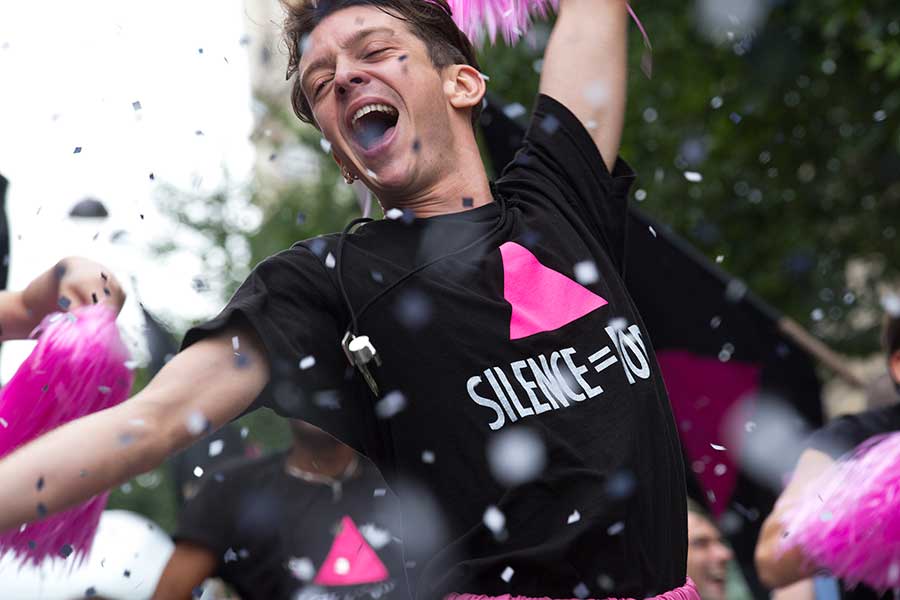Sean (Nahuel Pérez Biscayart), one of the main characters in “BPM,” opening Nov. 3 at the Ritz at the Bourse, is a radical and HIV-positive guy in the French contingent of ACT UP. He is arguably the group’s most charismatic member: passionate, vocal and fearless. He demands more from everyone because his life, along with so many others infected with AIDS, is at stake.
In co-writer/director Robin Campillo’s remarkable drama, Sean captures the attention of Nathan (Arnaud Valois), an HIV-negative gay man who joins ACT UP as the film opens. As they participate in actions from passing out condoms at a high school to getting arrested for demanding needle-exchange programs, Sean and Nathan start to fall in love. They negotiate sex with condoms and, in a moving sequence, Sean explains how he contracted AIDS, at 16, during his first gay sexual experience. The Argentine-born Biscayart, who has played in other gay films including “Glue” and “All Yours,” gives an exceptional, heartbreaking performance.
The actor spoke with PGN about making “BPM.”
PGN: What interested you in playing an HIV-positive character in “BPM”?
NPB: The topic can be melodramatic but it’s how you treat the theme and the subject. I felt right away that Robin [Campillo] the co-writer/director] was trying to capture intimate moments and details of this gang. We were not trying to make an epic film about martyrs. The approach was centered in the characters and their relationships, regardless of the weight the story might carry. I’m not a melodramatic actor, so I didn’t approach it in a melodramatic way.
PGN: You were 3 years old at the time this film takes place. What research did you do on ACT UP, and how aware were you of the organization beforehand?
NPB: I was in Argentina then, and there was no ACT UP there. I had a vague memory of the pink triangles. The first time I heard about it was when I read the script and spoke to Robin about the film. I was impressed and engrossed by the spectacular actions they carried out. They were supposed be victims but they took the power over the sickness and the conflicts. They were key in taking charge of their destiny.
PGN: Sean “lives politics in the first person.” What can you say about committing to a cause that you are willing to risk your life for?
NPB: Wow. That’s a big thing. In personal terms, I’m always trying to change things I don’t like. When I feel anguished, I try to see why and resolve the conflict. I don’t have the power to change everything around me, so I try to have empathy towards others. Growing up in Argentina, which is such a politicized society, we would go out on the street when people don’t please us with strikes, riots and demonstrations. I used to go to demonstrations against the [Argentine] dictatorship with my family every year. And I did some things in high school. We can change things if we want. The reason why the world is the way it is, is because we oppose things we don’t like.
PGN: What was it like to (re)create the “actions” in the film?
NPB: It was fun to play. I never approach acting as a dramatic voyage. They were radical actions and extreme; it never got solemn. I enjoyed those scenes and used them as a way to go through different emotions.
PGN: There were some demands that were both emotional and physical in your role. Can you talk about how you got into the character’s body and mindset?
NPB: Sean was impassioned to live through sex and actions, and that’s the power of these people. They could turn intimate grief, pain and weakness into a huge … they were fighting so they could live better and longer. I don’t see any other way of approaching the character if not through the body. We’re talking about sickness. They were making a health issue visible to the world. It was crucial, and it was natural. Everything was very physical. I can’t imagine the film without physicality. The characters talk a lot, but it’s a film where words and discourses are in the direction of actions.
PGN: On that same note, you have some very erotic scenes. Can you talk about creating that intimacy and vulnerability on screen?
NPB: I think what’s exciting about how we shot the sex scenes is that they were not idealized sex scenes, which have nothing to do with reality. Having sex is what we see in the film — the awkwardness in the opportunity to open up to someone you don’t know. It makes you vulnerable, of course. Arnaud [Valois] and I spent time to see if we felt comfortable together. I felt he was like a brother and that was important. The sex scene was a bit choreographed, so we could move, open, breathe and play. The characters open up in that scene too. It is about the emotion. Sex scenes are complex and interesting because of the emotion.

